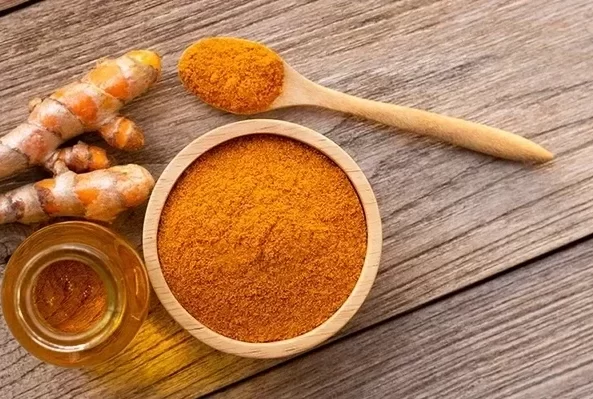Turmeric is a bright yellow spice that comes from the root of the Curcuma longa plant, which is native to Southeast Asia. It has a warm, bitter taste and is commonly used in cooking as a spice, particularly in Indian and Southeast Asian cuisines. The active compound responsible for turmeric’s vibrant color and many of its health benefits is curcumin.
Here are some key points about turmeric:
- Curcumin Content: Curcumin is the main bioactive compound in turmeric, known for its anti-inflammatory and antioxidant properties. However, the actual curcumin content in turmeric is relatively low, so using turmeric in larger amounts or taking curcumin supplements is sometimes done to maximize its potential health benefits.
- Culinary Use: Turmeric is a staple ingredient in curry powders and is used to flavor a variety of dishes, including soups, stews, and rice dishes. It’s also used to add color to mustard and various spice blends.
- Traditional Medicine: Turmeric has a long history of use in traditional medicine, particularly in Ayurvedic medicine and traditional Chinese medicine, where it has been used to treat various ailments.
- Health Benefits: While more research is needed, some studies suggest that curcumin, the active compound in turmeric, may have potential health benefits, including anti-inflammatory effects, antioxidant properties, and potential benefits for conditions like arthritis, heart disease, and certain neurological disorders.
- Supplements: Turmeric supplements, often containing concentrated curcumin extracts, are available for those who may want to increase their intake of this compound. It’s essential to consult with a healthcare professional before using supplements, especially if you have existing health conditions or are taking medications.
Turmeric is generally recognized as safe when used in moderate amounts in cooking. Including turmeric in your diet can add both flavor and potential health benefits to your meals. However, for therapeutic purposes or if you’re considering turmeric supplements, it’s best to seek guidance from a healthcare professional.
Curcumin, the main bioactive compound in turmeric, has been studied for its potential anti-inflammatory effects. Here’s how turmeric may help in addressing inflammation:
- Inhibiting Inflammatory Pathways: Curcumin has been found to block certain molecules that play a key role in inflammation. It can interfere with the activity of enzymes involved in the inflammatory process.
- Reducing Inflammatory Markers: Studies suggest that curcumin may lower the levels of various inflammatory markers in the body, such as cytokines and certain proteins.
- Antioxidant Properties: Curcumin is also known for its antioxidant properties, which means it can neutralize harmful free radicals. Free radicals can contribute to inflammation, and antioxidants help combat their effects.
- Potential for Joint Health: Turmeric has been traditionally used to address joint pain and arthritis. Some research indicates that curcumin may help alleviate symptoms of osteoarthritis and rheumatoid arthritis.
It’s important to note that while turmeric and curcumin have shown promise in preclinical and clinical studies, the overall effectiveness can vary. Curcumin has low bioavailability, meaning the body doesn’t absorb it well. Consuming turmeric with black pepper, which contains piperine, can enhance curcumin absorption.
If you’re considering turmeric or curcumin supplements for anti-inflammatory purposes, it’s advisable to consult with a healthcare professional. They can provide guidance on the appropriate dosage and discuss potential interactions with medications you may be taking.
Incorporating turmeric into your diet through cooking can also be a flavorful and healthful way to enjoy its potential benefits. However, it’s unlikely that dietary turmeric alone will provide the high concentrations of curcumin used in some research studies, so additional supplementation may be considered in certain cases.
ombining black pepper with turmeric is a common practice and can enhance the absorption of the active compound in turmeric, curcumin. The reason behind this is that black pepper contains a compound called piperine, which has been shown to improve the bioavailability of curcumin.
Here’s how the combination works:
- Enhanced Bioavailability: Curcumin, the primary bioactive compound in turmeric, is poorly absorbed by the bloodstream. Piperine in black pepper can significantly enhance the absorption of curcumin by inhibiting certain enzymes in the digestive tract that break it down.
- Increased Effectiveness: The combination of turmeric and black pepper is often referred to as “golden paste” or “golden milk.” Consuming turmeric with black pepper allows for better utilization of curcumin in the body, potentially increasing its effectiveness in providing health benefits.
Incorporating turmeric into your diet from time to time is a great idea, as it not only adds a warm, earthy flavor to your dishes but can offer health benefits. Here are some simple ways to use turmeric in your cooking:
- Curries: Turmeric is a staple in curry recipes, contributing both color and flavor. You can use it in various types of curries, whether they involve meat, vegetables, or legumes.
- Soups and Stews: Add a pinch of turmeric to soups and stews for extra depth of flavor and its potential health benefits.
- Rice Dishes: Turmeric can be used to color and flavor rice. Try adding it to rice dishes, such as pilaf or biryani.
- Roasted Vegetables: Toss vegetables like cauliflower, carrots, or potatoes in a bit of turmeric, along with other spices, before roasting them.
- Smoothies: Add a small amount of turmeric to your morning smoothie for a nutritional boost. Pair it with ingredients like ginger, pineapple, or mango for a flavorful combination.
- Golden Milk: Make a warm and comforting golden milk by combining turmeric with milk (or a plant-based alternative), black pepper, and a sweetener. This is a popular beverage in some cultures.
- Salad Dressings: Mix turmeric into homemade salad dressings for a unique and healthy twist.
When using turmeric, it’s beneficial to include a source of black pepper in your dish to enhance the absorption of curcumin. The combination of turmeric and black pepper is often used to maximize the potential health benefits.
Remember that turmeric can stain, so be cautious about surfaces and clothing. Additionally, if you’re using turmeric for its potential health benefits, consider consulting with a healthcare professional to ensure it aligns with your individual health needs.





